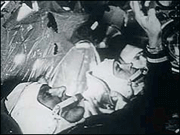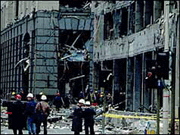April 24
[ 2007-04-24 08:00 ]
 |
| Vladimir Komarov was on
his second space flight |
| 1967: Russian cosmonaut dies in space
crash |
England have
The Soviet Union has announced the catastrophic failure of its latest
space mission, with the crash of Soyuz 1 and the death of the cosmonaut on
board.
Colonel Vladimir Komarov, 40, is the first known victim of a space
flight. He was an experienced cosmonaut, on his second flight, and had
completed all his experiments successfully before returning to earth.
But within seconds of landing, just after he re-entered the earth's
atmosphere, the strings of the parachute intended to slow his descent
apparently became tangled.
The spaceship hurtled to the ground from four miles up. It is likely
that Colonel Komarov was killed instantly on impact.
Gold Star for heroism
A message of condolence from the Communist Party in Moscow described
him as "a loyal son of our motherland and a courageous explorer of space."
He has been decorated posthumously with a second Gold Star for heroism,
and his ashes will be buried at the Kremlin wall - one of the highest
honours accorded to a Soviet citizen.
News of the death of Colonel Komarov was greeted with regret and
concern in the United States. The head of the US space programme, James
Webb, called for greater cooperation in space exploration.
The team of 47 American astronauts working at Houston in Texas sent a
telegram of condolence to their Russian rivals.
Mystery crash
The announcement from Moscow gave few details surrounding events
leading up to the disaster, and there remain a number of mysteries
surrounding the last moments of the doomed flight.
The Soyuz 1 is known to be a new and heavier type of spacecraft, built
as part of the Soviet attempt to land a man on the moon, and Colonel
Komarov was thought to be testing it when the disaster happened.
Correspondents in Moscow had indications that all was not well with the
flight from as early as yesterday, when earlier reports on Moscow Radio
suddenly stopped and there was no mention of the space flight for nearly
13 hours.
Experts have questioned why Colonel Komarov did not use an ejection
system to get out of the spacecraft. The cosmonaut was also known to have
suffered from heart problems.
|
|
|
|
 |
| The explosion shattered
hundreds of windows |
|
1961: Nazi war crimes trial
begins | Artificially 1969:
The
A
massive bomb has ripped through the heart of the City of London, killing
one and injuring more than 40.
The explosion shook buildings and shattered hundreds of windows,
sending glass showering down into the streets below. A mediaeval church,
St Ethelburga's, collapsed; another church and Liverpool Street
underground station were also wrecked.
The cost of repairing the damage has been estimated at more than ?bn.
We didn't expect them to do it again in the same area.
Security
guard Raymond Fayers
Police had received coded warnings, but were
still evacuating the area when the bomb went off. Most of those injured
were security guards, builders and maintenance staff, and those who had
come into their offices to work at the weekend.
Police said the bomb was hidden in the back of a dark blue tipper
truck, parked in Bishopsgate.
It was home-made, with about a ton of fertiliser - similar to the bomb
which devastated the Baltic Exchange a year ago, killing three people.
Repairs to the Exchange had just been completed, and the building
re-opened, when the same banks were damaged again by today's blast.
One of those injured, security guard Raymond Fayers, said, "We were all
surprised that they picked the same hotspot again. Every night, virtually,
we get some sort of scare, but we didn't expect them to do it again in the
same area."
The dead man was found under rubble during a five-hour search of debris near where the bomb went off.
He has not yet been identified.
Back in business
Police say they are in no doubt that the bomb was planted by the IRA,
although the organisation has not said it carried out the attack.
The explosion comes just over a month after the Warrington bomb, which
killed two children. The IRA expressed its regret after the outcry that
followed.
Commander David Tucker, of the Anti-Terrorist Squad, said, "We had
hoped after the deaths in Warrington that there would be some sort of
turning point, but that seems to be not the case."
The area around the site of today's blast remains sealed off, but the
Lord Mayor of London has promised that the City will be back in business
on Monday.
|
|
| Vocabulary:
|
| |
|
tangled: complicated and difficult to
unravel(缠结的,复杂的,难以解开的)
debris:
wreckage(残骸,碎片)
|
|